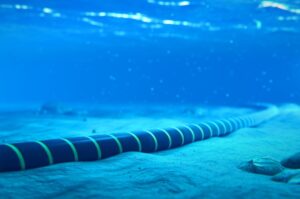Sweden has released a ship suspected of cutting an undersea fiber-optic cable between Latvia and Sweden on January 26, the Scandinavian country’s prosecutor’s office said today, adding that it dismissed the possibility of sabotage.
“The investigation now clearly shows that it was not a case of sabotage,” the prosecutor’s office said in a statement.
“It has been proven that a combination of weather conditions and faulty equipment and navigational errors contributed to the cable cut,” the prosecution statement said.
Sweden had arrested a Bulgarian ship, the Vezhen, concerning an investigation into “aggravated sabotage”.
The managing director of the Bulgarian shipping company Navibulgar had denied any culpable act.
The ship did, however, cause damage to the cable, according to the prosecution. The investigation is continuing to determine whether other violations were committed in connection with the incident.
In the early hours of January 26, a fiber optic cable of the Latvian National Radio and Television Centre (LVRTC) connecting the Swedish island of Gotland to the Latvian city of Ventspils was cut.
LVRTC had said preliminary assessments indicated “external factors”.
In a heightened vigilance against threats of “hybrid warfare”, Norway briefly detained a Norwegian ship with a Russian crew suspected of involvement in the incident between Thursday and Friday before releasing it in the absence of evidence.
Many undersea cables have been damaged or cut in recent months in the Baltic Sea.
To prevent such incidents from recurring, NATO announced in January the launch of a patrol mission to protect these sensitive undersea infrastructures.
Planes, ships, and drones are now being sent massively and regularly to the Baltic Sea as part of a new mission called “Baltic Guardian”.
Ask me anything
Explore related questions





